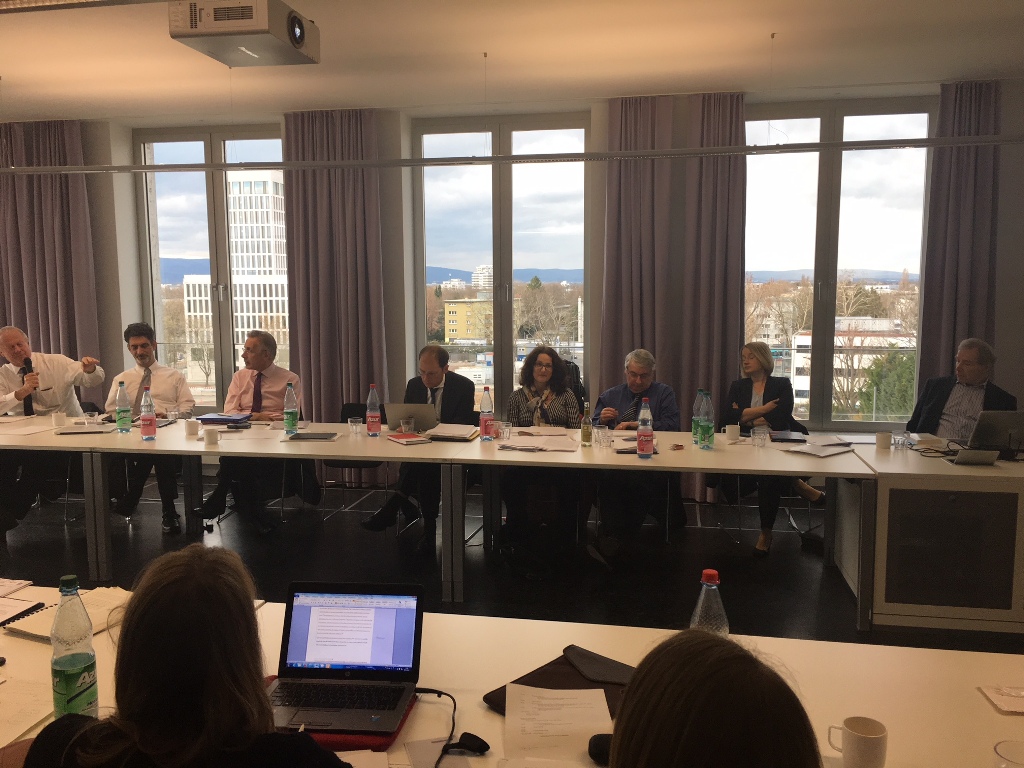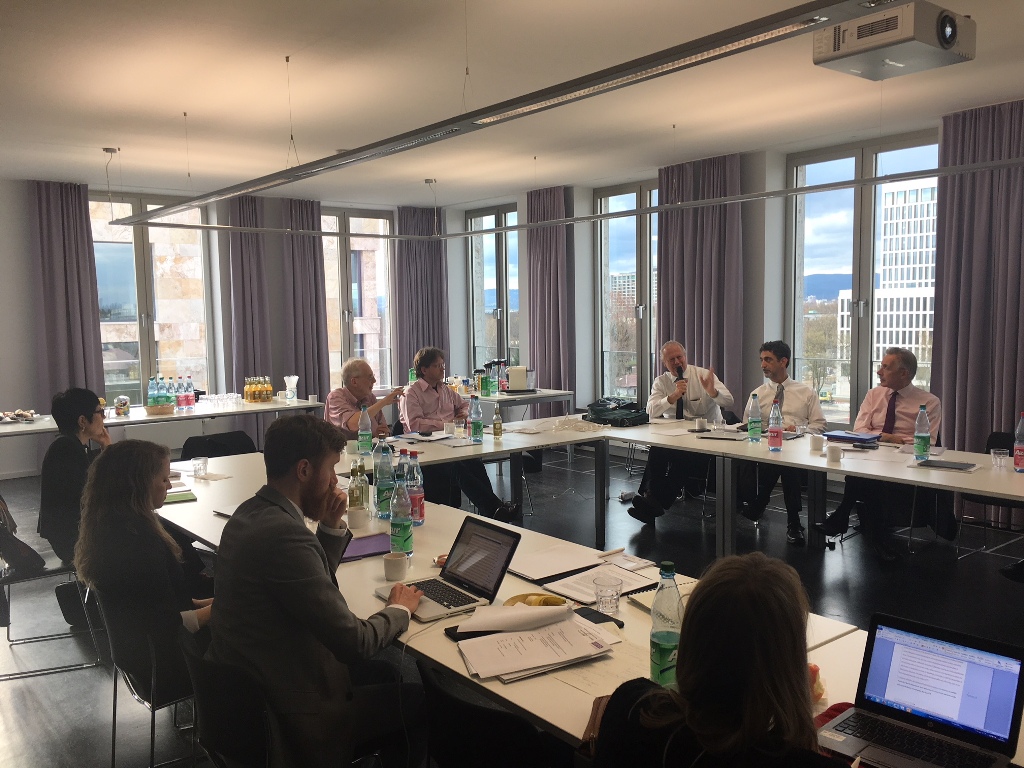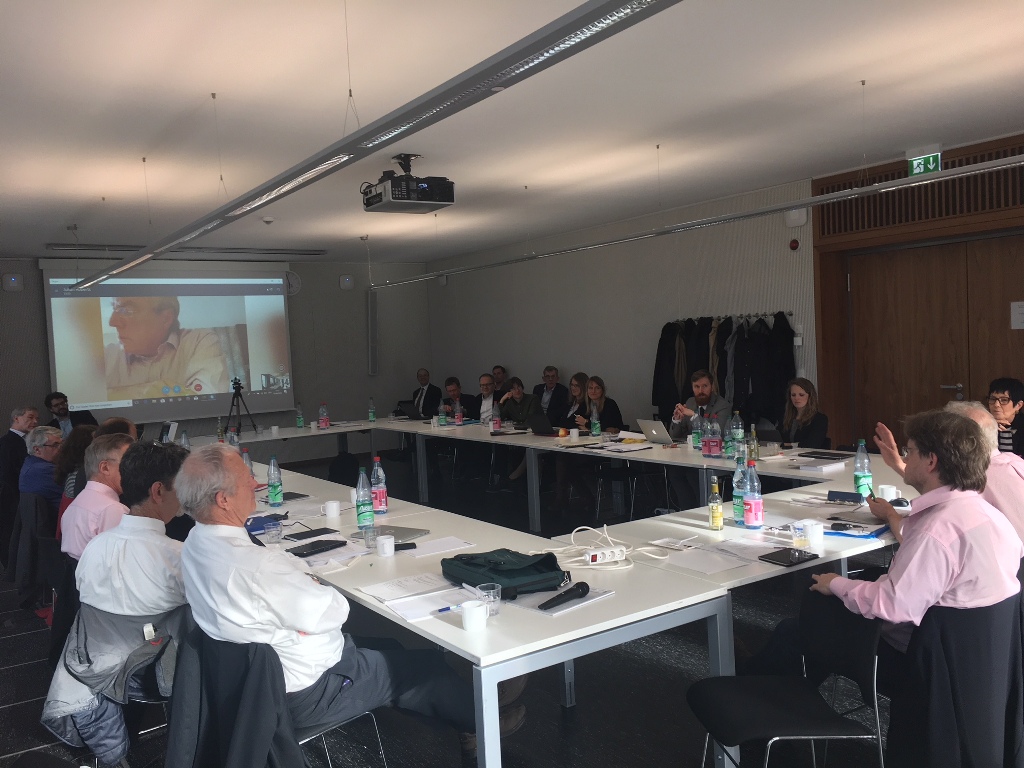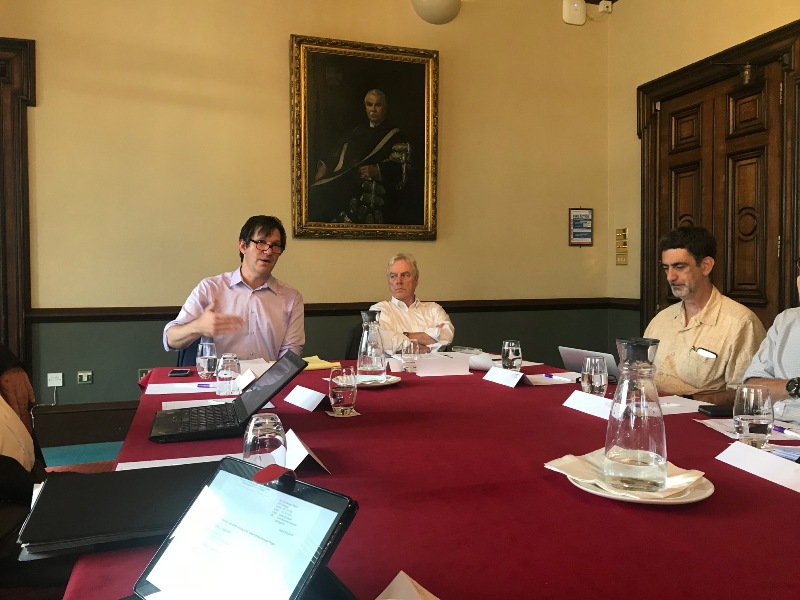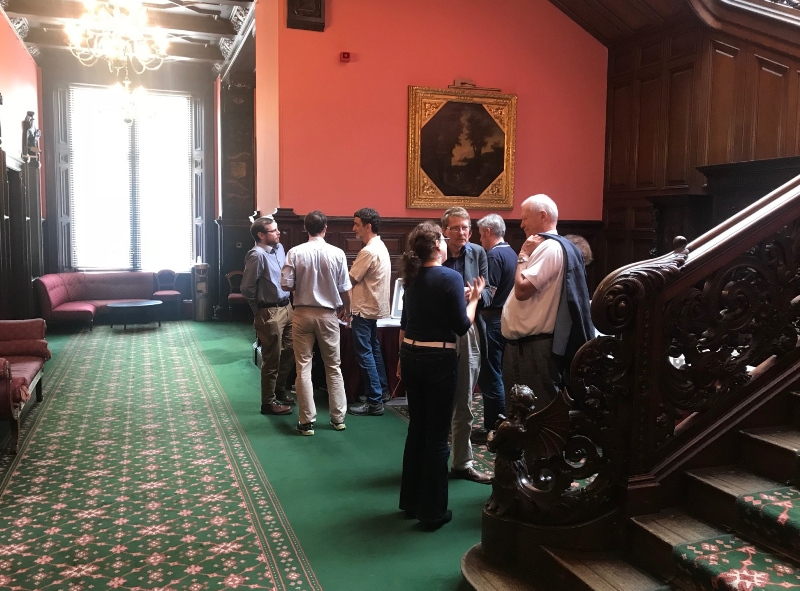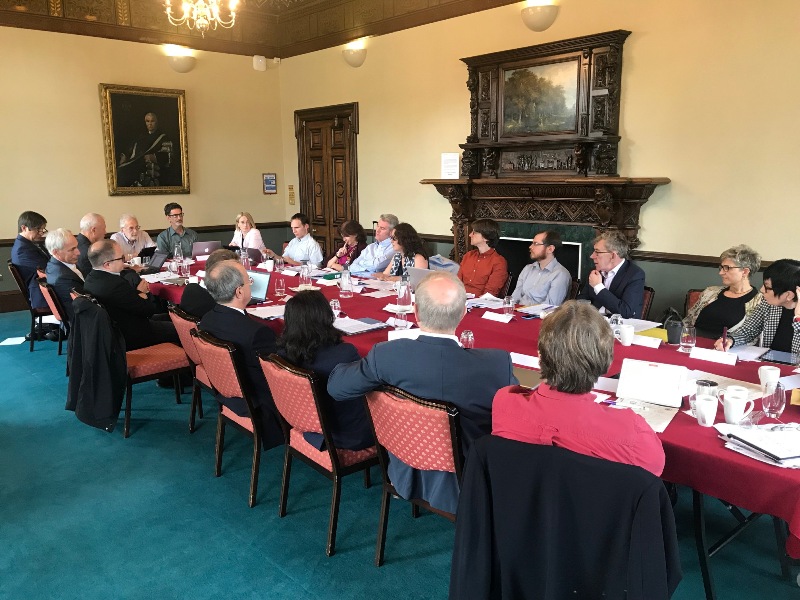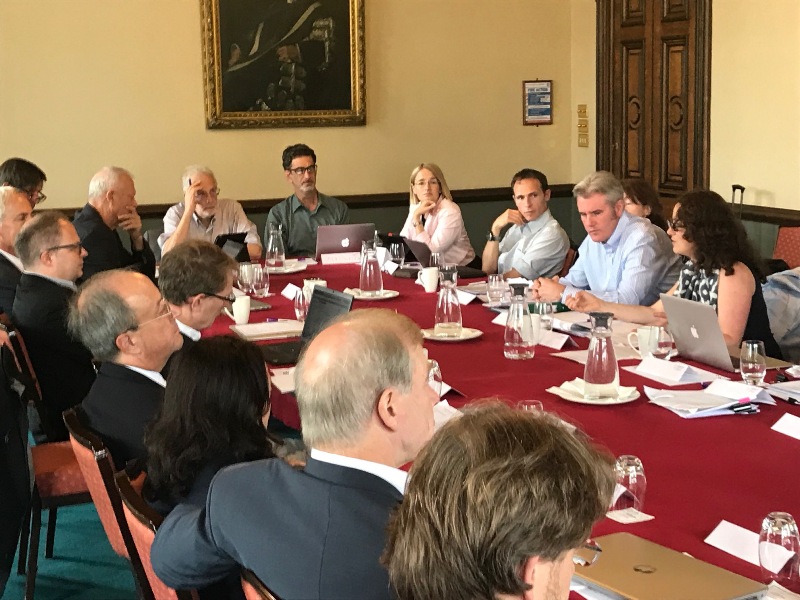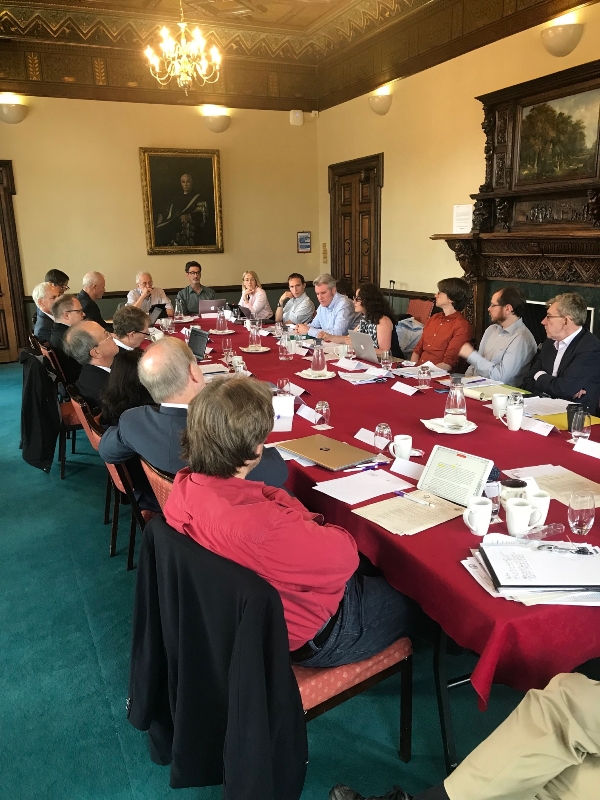Im Sommersemester bietet Herr Prof. Dr. Kai Ambos ein Seminar zu aktuellen Themen im Völkerstrafrecht an.
Nähere Informationen finden Sie hier: Seminar

Publikum

Gesprächsaustausch

Aufgestellte Kommentarliteratur

Seitenaufnahme der Literatur

Podium

Univ.-Prof. Dr. Dr. h.c. Kai Ambosbei der Vorstellung

Die Gäste hören interessiert zu

Univ.-Prof. Dr. Dr. h.c. Kai Ambos bei der Rede

Gruppenportrait

Weiteres Gruppenportrait
The main research areas of the Chair, held by Prof. Dr. Kai Ambos since June 2003, in addition to the classical areas such as general criminal law and criminal procedure, involve international criminal law – especially the areas of national jurisdiction, international criminal law and European criminal law – as well as comparative law (albeit focusing mainly on Spanish and Portuguese speaking as well as Common Law areas). In order to be able to research the topics mentioned above adequately, a “Library for Foreign and International Criminal Law and Procedure” has been established. This library belongs to the Department of Foreign and International Criminal Law, led by Prof. Dr. Kai Ambos, and is part of the Criminal Law Library of the Faculty of Law. Meanwhile, the Library has developed into a center for research dealing with foreign and international criminal law matters
Lebanon Tribunal issues definition of terrorism
Amicus Curiae Brief on the question of the applicable terrorism offence in the proceedings before the Special Tribunal for Lebanon, with a particular focus on a "special" special intent and/or a special motive as additional subjective requirements, Re.: Case No.: STL-11-01/1, Scheduling order of the President, 21 January 2011
- Download: Lebanon Tribunal issues definition of terrorism
- Dicision of the Appeals Chamber
Friedensprozeß Kolumbien:
-
Rechtliche Stellungnahme (Februar 2005)
-
Dictamen legal (März 2005)
Strafverfolgung in der Bundesrepublik:
- Gutachten
Die Forschungsschwerpunkte des im Juni 2003 neu besetzten Lehrstuhls liegen - neben der Bearbeitung klassischer Themen aus dem Allgemeinen Teil des Strafrechts und des Strafverfahrensrechts - im Bereich des internationalen Strafrechts, genauer im Strafanwendungsrecht, Völkerstrafrecht und Europäischen Strafrecht, sowie in der Strafrechtsvergleichung (mit Schwerpunkt auf dem spanisch- und portugiessprachigen sowie Common law Rechtskreis).
Um diese Forschungstätigkeit sinnvoll betreiben zu können, wurde eine "Bibliothek für ausländisches und internationales Strafrecht" aufgebaut. Diese Bibliothek gehört zu der vom Lehrstuhlinhaber geleiteten Abteilung „ausländisches und internationales Strafrecht“ des Instituts für Kriminalwissenschaften und ist Teil der strafrechtlichen Bibliothek der juristischen Fakultät. Sie hat sich inzwischen zu einem Zentrum für ausländische und internationalstrafrechtliche Forschung entwickelt.
Prof. Kai Ambos and Prof. Su Jiang (Bejing University) initiated a Chinese German Dialogue on Core Concepts in Criminal Law and Criminal Justice. There are numerous topics in both China and Germany which deserve to be explored from a comparative perspective to the benefit of both legal systems. Contrary to previous Chinese/German initiatives, this project takes a more discursive and communicative approach and employs as a common language English in order to have a more fluid discussion without relying on translations/translators. The dialogical form of talking with each other in lieu of talking about each other has been proven enriching and successful in a different context, namely the Anglo-German dialogue project, see here.
The first workshop of the Chinese-German Dialogue group was held on 17-18 July 2023, in Göttingen, Germany, here is the program and some photos.
Seven topics were selected, with both German and Chinese authors presenting their unique perspectives on each issue. The workshop commenced with the authors briefly summarizing their (draft) papers, followed by comments from assigned commentators. Subsequently, the discussion was opened up to the entire group. The core objective of the workshop was to foster lively discussions and provide constructive feedback on the (draft) papers. It has been agreed to submit the revised (complementary) papers until 15 February 2024 with a view to a further publication.
The coordinators and participants thank the Chinese Konfuzius Institute at the University Göttingen, the Göttingen Association for Criminal Law, Criminal Justice and Criminology as well as the publishers Beck, Duncker & Humblot and Nomos for their generous support.
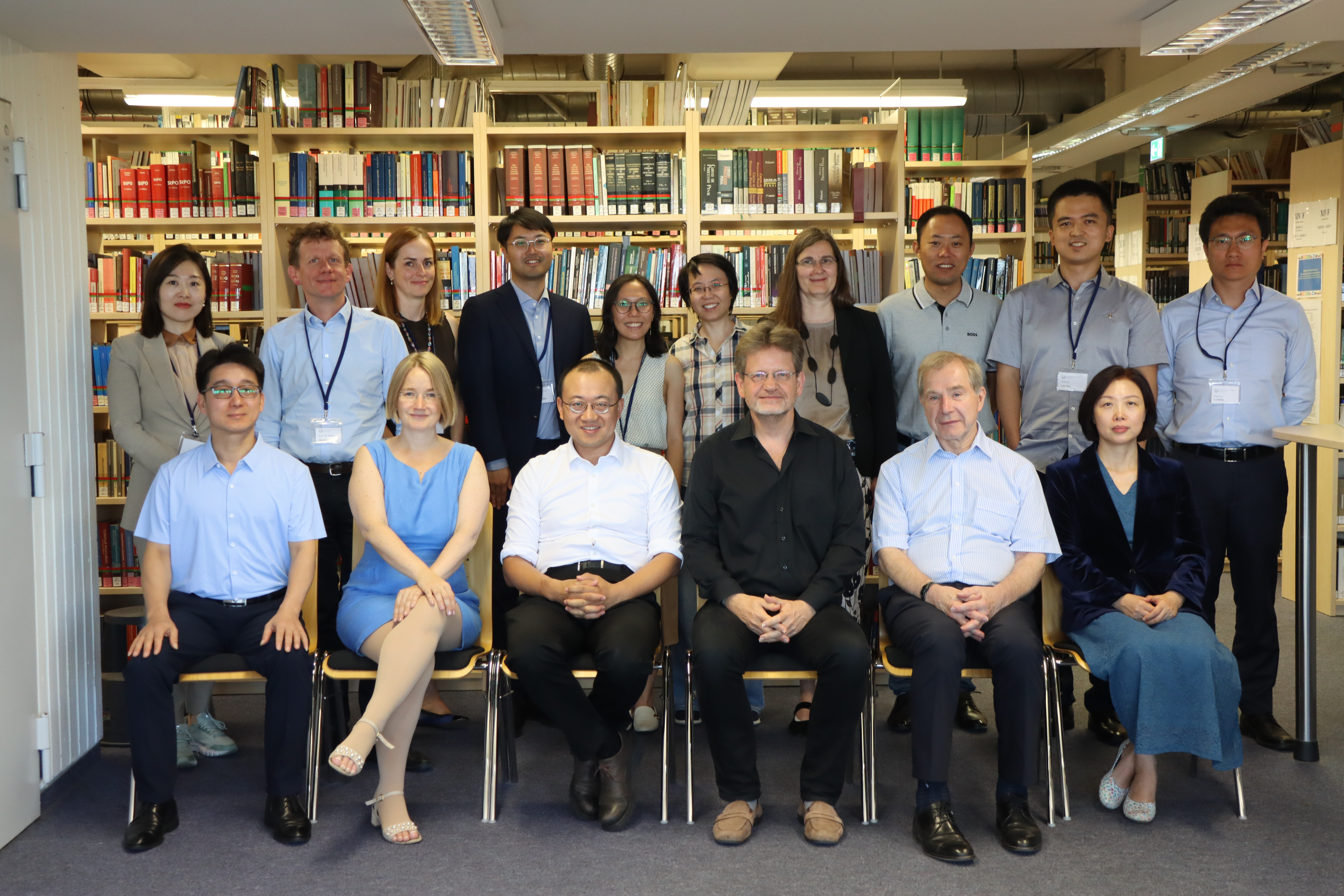
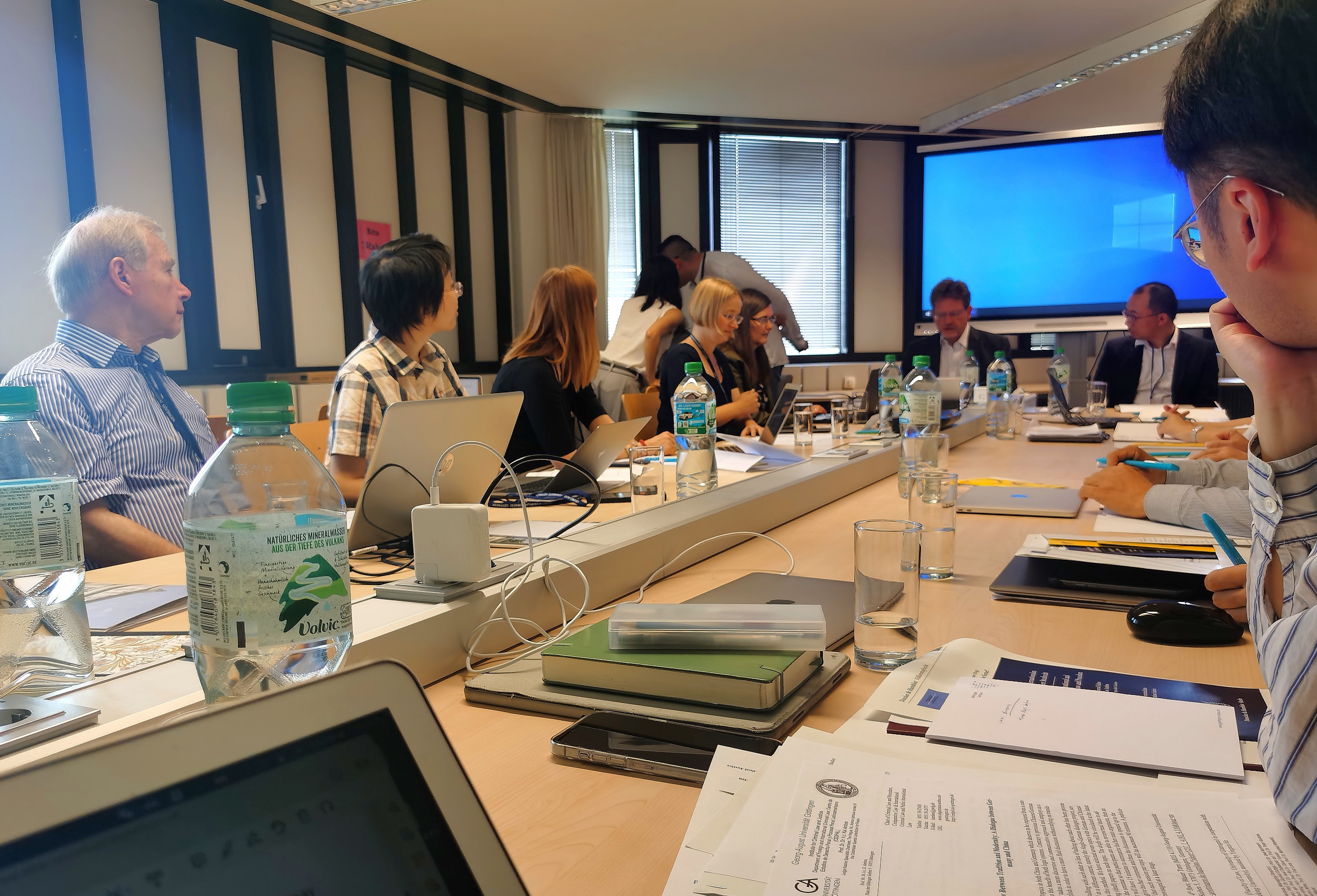
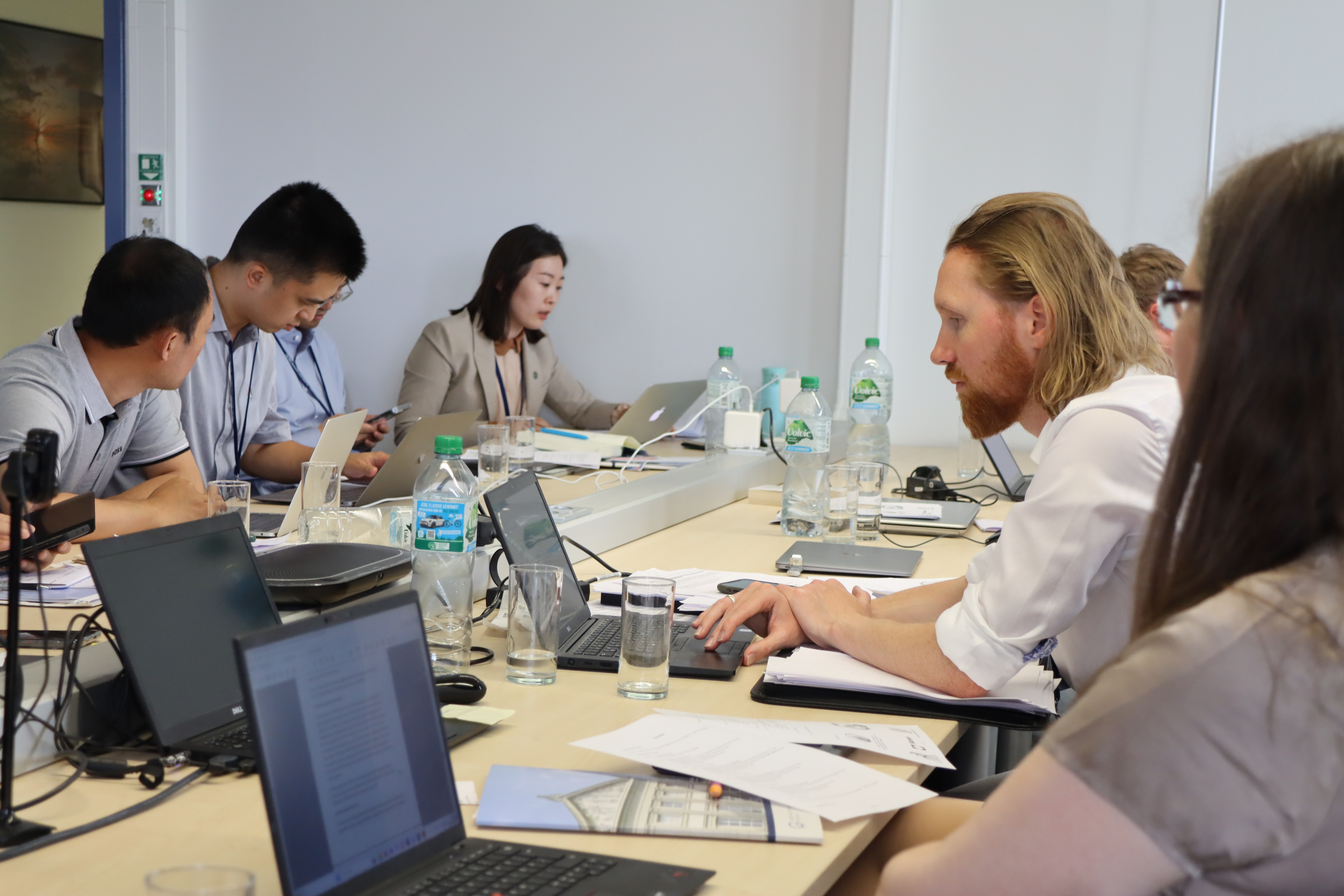
Project Manager: Apl.-Prof. Dr. Peter Rackow
Universität Göttingen erhält EU-Förderung für Forschung zu den Auswirkungen der Digitalisierung des Strafverfahrens
Editors: Kai Ambos, Alexander Heinze and Philipp Ambach
The Project’s aim is to publish a commentary on the law of evidence at International Criminal Tribunals. A number of eminent legal practitioners and scholars in the field of International Criminal Law give a detailed rule-by-rule analysis of the relevant body of law on evidence at International Criminal Courts and Tribunals. This includes a critical assessment of differing approaches across the institutions as well as jurisprudential trends and developments. It therefore serves as a comprehensive guide for the practitioner and scholar alike for the law on evidence as practiced on the international level.
Notwithstanding the existing research on International Criminal Evidence, the applicants’ proposed project of creating a commentary on International Criminal Evidence is unparalleled. We strike a balance between the growing jurisprudence of International Criminal Tribunals and academic opinions. Due to the strong practitioners’ perspective, we focus on the case law of the International Criminal Court (ICC) and that of other tribunals, thereby moving away from an emphasis on academic opinions. The classification and appraisal of the growing ICC jurisprudence within the commentaries will be a true asset for any International Criminal Law practitioner.
Due to the high relevance of the project, the applicants envision the project to be completed and the commentary to be published no later than in course of the year 2019.
The renowned publisher C.H. Beck has agreed to publish the book in its international program (Beck international with Hart, UK) and will already announce its publication during Frankfurt Book Fair 11-15 October 2017.
List of Authors
| Author | Organisation/Institution |
| Ambach, Philipp | Chief of the Victims Participation and Reparations Section, Registry, International Criminal Court |
| Ambos, Kai | Chair for Criminal Law, Criminal Procedure, Comparative Law and International Criminal Law, Head Department of Foreign and International Criminal Law, Institute for Criminal Law and Justice, Georg-August-Universität Göttingen, Judge Kosovo Specialist Chambers |
| Black, Colin | |
| Boas, Gideon | Barrister-at-Law and Professor at La Trobe University, Melbourne |
| Brady, Helen | Senior Appeals Counsel, Office of the Prosecutor, International Criminal Court, Office of the Prosecutor, formerly International Criminal Tribunal for the Former Yugoslavia |
| Carlson, Matt | Senior Legal Officer, Chambers, United Nations Mechanism for International Criminal Tribunals, Appeals Chamber, formerly International Criminal Tribunal for Rwanda |
| Carnero Rojo, Enrique | Legal Officer, Office of Public Counsel for Victims, Registry, International Criminal Court |
| Cengic, Amir | Legal Officer, Chambers, United Nations Mechanism for International Criminal Tribunals, formerly International Criminal Tribunal for the former Yugoslavia |
| Chaitidou, Eleni | Legal Officer, International Criminal Court |
| Combs, Nancy | Ernest W. Goodrich Professor of Law, Kelly Professor of Teaching Excellence, and Director, Human Security Law Center, William & Mary Law School |
| David, Elena-Alexandra | Associate Legal Officer, Victims Participation and Reparations Section, Registry, International Criminal Court |
| Gaynor, Fergal | Consultant; former Common Legal representative of Victims, International Criminal Court |
| Gibson, Kate | Defence Counsel, International Criminal Court, United Nations Mechanism for International Criminal Tribunals |
| Gillett, Matthew | Trial Counsel, International Criminal Court, Office of the Prosecutor |
| Gosnell, Chris | Defence Counsel, International Criminal Court, International Criminal Tribunal for Rwanda |
| Goy, Barbara | Senior Appeals Counsel, Office of the Prosecutor,United Nations Mechanism for International Criminal Tribunals, Office of the Prosecutor |
| Halling, Matt | Associate Legal Officer, Judiciary,International Criminal Court |
| Heffernan, Liz | Associate Professor of Law, Trinity College Dublin |
| Heinsch, Robert | Professor of International Law, University of Leiden |
| Heinze, Alexander | Assistant Professor, Department of Foreign and International Criminal Law, Institute for Criminal Law and Justice, Georg-August-Universität Göttingen |
| Hinek, Silva | Legal Officer, Chambers, International Criminal Tribunal for the Former Yugoslavia |
| Hohler, Beti | International Criminal Court, Office of the Prosecutor |
| Jacobs, Dov | Assistant Professor, Leiden University |
| Jasini, Rudina | Former Attorney International Criminal Tribunal for the Former Yugoslavia/ ECCC; ESRC GCRF Fellow at the Faculty of Law, University of Oxford |
| Karnavas, Michael | International Criminal Court, Defence |
| Khan, Karim A.A. | International Criminal Court, Defence |
| Körner, Thomas | Associate Legal Officer, Judiciary, International Criminal Court |
| Küfner, Stefanie | Legal Officer, Chambers, International Criminal Tribunal for the Former Yugoslavia, Trial Chamber |
| Lawson, Clare | Legal Officer, Kosovo Specialist Chambers |
| Leff, Jesse | Legal Officer, Chambers, United Nations Mechanism for International Criminal Tribunals |
| Little, Elizabeth | Special Assistant to the Registrar, Registry, ICC (former legal officer in the Trial and Appeals Chamber of the ICC for 8 years) |
| McDermott, Yvonne | Associate Professor of Law, Swansea University |
| Menon, Aditya | Appeals Counsel at the Office of the Prosecutor at the Mechanism for International Criminal Tribunals |
| Menon, Parvathi | Research Fellow, Max Planck Institute for Procedural Law |
| Min, Yongjune | Legal Officer in Chambers of the Mechanism of the International Criminal Tribunals |
| Peykova, Mariya | Judicial Assistant, Court of Appeal of England and Wales |
| Raynor, Keith | Judge, Kosovo Specialist Chambers |
| Re, David | Judge, Special Tribunal for Lebanon |
| Reid, Bob | International Criminal Tribunal for the Former Yugoslavia, Office of the Prosecutor |
| Sachithanandan, Pubudu | Trial Counsel, Office of the Prosecutor, International Criminal Court |
| Schmidt, Kelly | Legal Officer, Chambers, International Criminal Tribunal for the Former Yugoslavia |
| Tochilovsky, Vladimir | Formlerly International Criminal Tribunal for the Former Yugoslavia, Office of the Prosecutor, Investigation Team Leader and Trial Attorney |
| Viktorova, Emiliya | Legal Officer, Chambers, United Nations Mechanism for International Criminal Tribunals |
| Woolaver, Hannah | Senior Lecturer in Public International Law, University of Cape Town |
Topical list of major issues relating to evidence and assigned author
I. Evidence: Context and Introduction
- Conceptual foundations (Kai Ambos)
- Burden / standard of proof (Dov Jacobs)
- Overview of modes and forms of evidence in various procedural stages (Philipp Ambach)
II. Different types of evidence
- General rules (Yongjune Min)
- Witness statement; Viva voce vs written statement (Pubudu Sachithanandan)
- Hearsay evidence (Jesse Leff)
- Expert evidence [excl. disclosure-related issues; see infra] (Elizabeth Little)
- Statement and testimony of the accused (Michael Karnavas)
-
Documentary evidence (Fergal Gaynor)
- Indirect material
- Bar table motion
- Forensic evidence (David Re)
- Alibi evidence (Parvathi Menon)
- Circumstantial evidence (Keith Raynor)
- Amicus Curiae (Hannah Woolaver)
- Evidence by victims and victim representatives [alternatively: “Views and concerns of victims”] (Enrique Carnero Rojo)
- Judicial notice and agreed facts (Silva Hinek)
III. Assessment of evidence (editing Alexander Heinze)
- General criteria / different assessment of different types of evidence/ applicable standard (Vladimir Tochilovsky)
- Authenticity and reliability (Helen Brady)
-
Relevance and probative value (Rudina Jasini)
- Inkl. translation
- Weight against prejudicial effect
- Corroboration of different types of evidence (Matt Carlson)
IV. Collection of Evidence
-
The Role of the Prosecutor (Bob Reid)
- Fugitives Component
- Continuation of Investigation
- Archiving of evidence
- The Role of the Chambers (incl. site visits) (Stefanie Kuefner/ Kelly Schmidt)
- Role of the Defence Lawyer (Kate Gibson)
- Various forms of legal assistance/cooperation between States and International Criminal Courts (Pascal Turlan)
- Intermediaries (Colin Black)
V. Disclosure of evidence
-
Prosecution Disclosure (Alexander Heinze)
-
General Remarks
- Definition of ‘disclosure’ in the material
- Disclosure and Human Rights
- Exculpatory Evidence
- Documents and Tangible Objects
- Witness Disclosure and limitations
- Notice (esp. ad hoc Tribunals) Art. 76(1)(a)/ DCC, pre-trial briefs in general
- Translation of Disclosed Material
-
General Remarks
-
The Role of the Chamber and the Registry (Eleni Chaitidou)
- Disclosure Relating to an arrest warrant
- Disclosure prior and after the Confirmation Hearing
-
Defence and victim disclosure (Chris Gosnell)
- Disclosure by the defence
- Disclosure to and from victim representative
- Notice
-
Forms to and restrictions of disclosure and the consequences of non-disclosure (Matt Halling)
- Disclosure versus confidentiality obligations
- Required consent of third party
- Failure to meet disclosure obligations [and remedies]
- Including Delayed disclosure / withholding evidence
- Intermediaries
- National security interests (Art. 72)
- Redactions
VI. Admissibility of evidence
- Admission of evidence and reasons for inadmissibility of evidence (Beti Hohler)
-
Exclusion of evidence (Yvonne McDermott)
- Means of obtaining evidence incl. unlawfully obtained evidence
- Practice to date
VII. Presentation and Modes of Evidence
- Trial Chamber’s Control over the Presentation of Evidence (Robert Heinsch)
-
Forms of Examination (Matthew Gillett)
- Key Rule: 140 ICC RPE
- Hostile Witnesses
- Prior recorded testimony (Clare Lawson)
- Witness preparation / witness coaching (Liz Heffernan)
- Oath (Amir Cengic)
-
Specific regimes for vulnerable witnesses (Aditya Menon)
- Sexual violence victims/ corroboration requirements
- In camera procedure
-
Immunity from testifying (including compellability of a witness) (Mariya Peykova)
- Compellability
- Immunity [Only Rule 73 ICC RPE, not Rule 74]
- Self-incrimination (Karim A.A. Khan)
- Electronic Courts and the Challenges in Managing Evidence (Thomas Koerner)
- Plea Bargaining/ Admission of Guilt (Nancy Combs)
VIII. Evidence at Sentencing and Post-Trial (editing Philipp Ambach)
- Evidence at Sentencing (Gideon Boas)
- Evidence in reparation proceedings (Elena-Alexandra David)
- Additional evidence on appeal (Barbara Goy)
- New evidence through review / revision + new evidence at re-trial (Emiliya Viktorova)
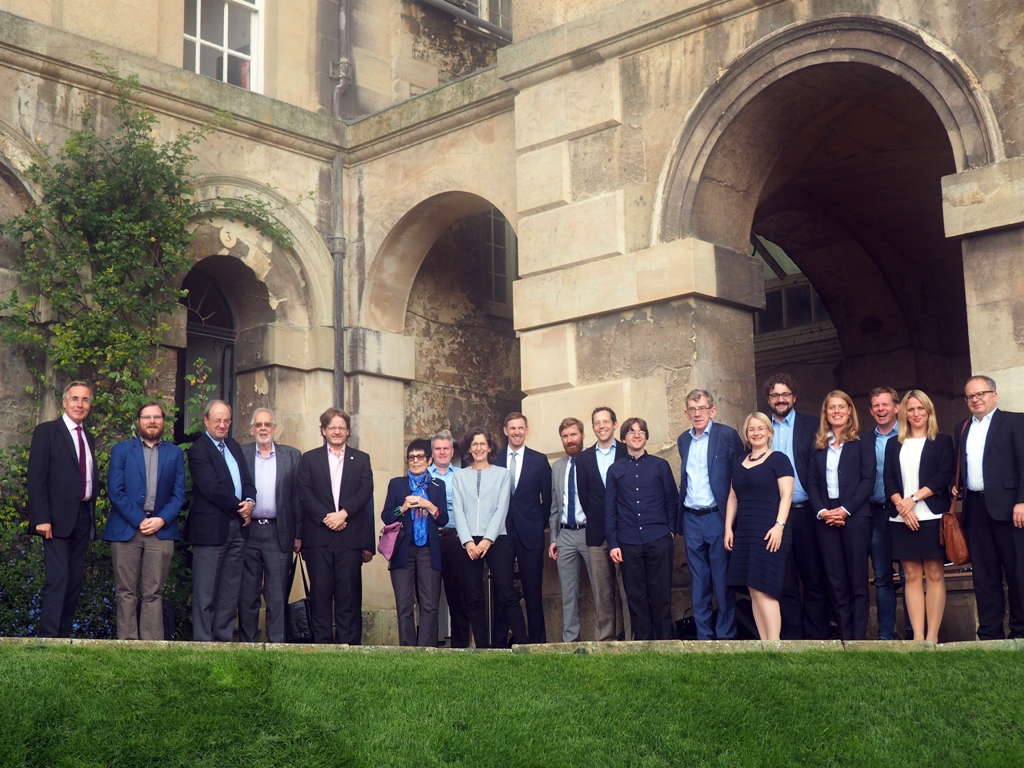 |
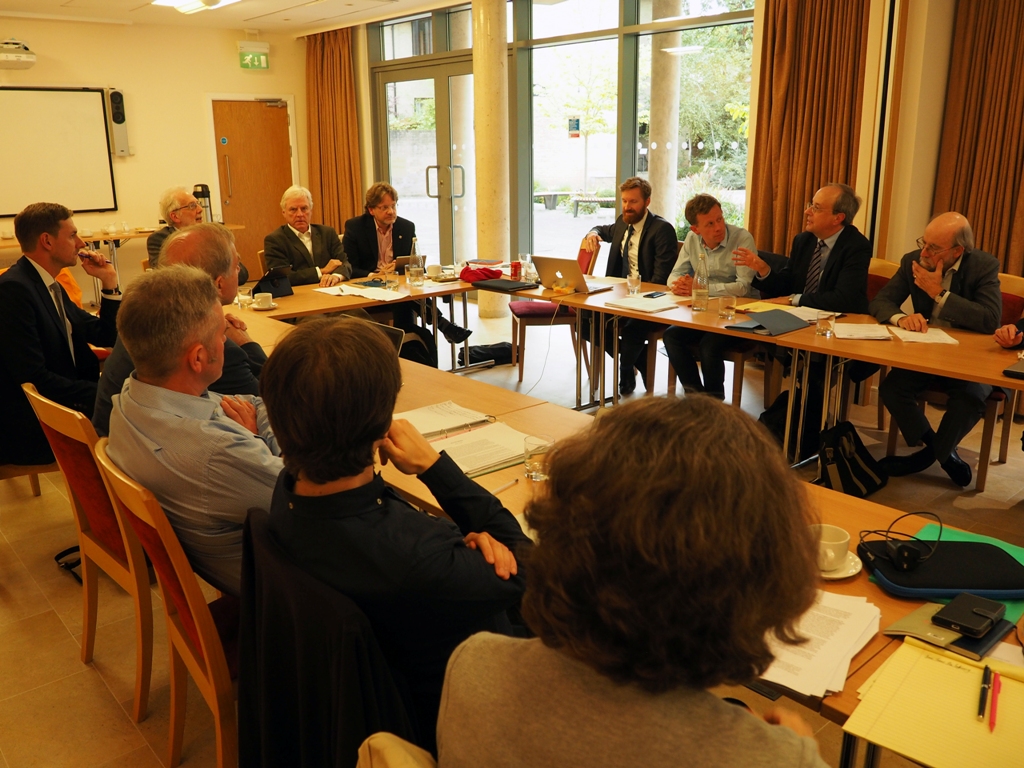 |
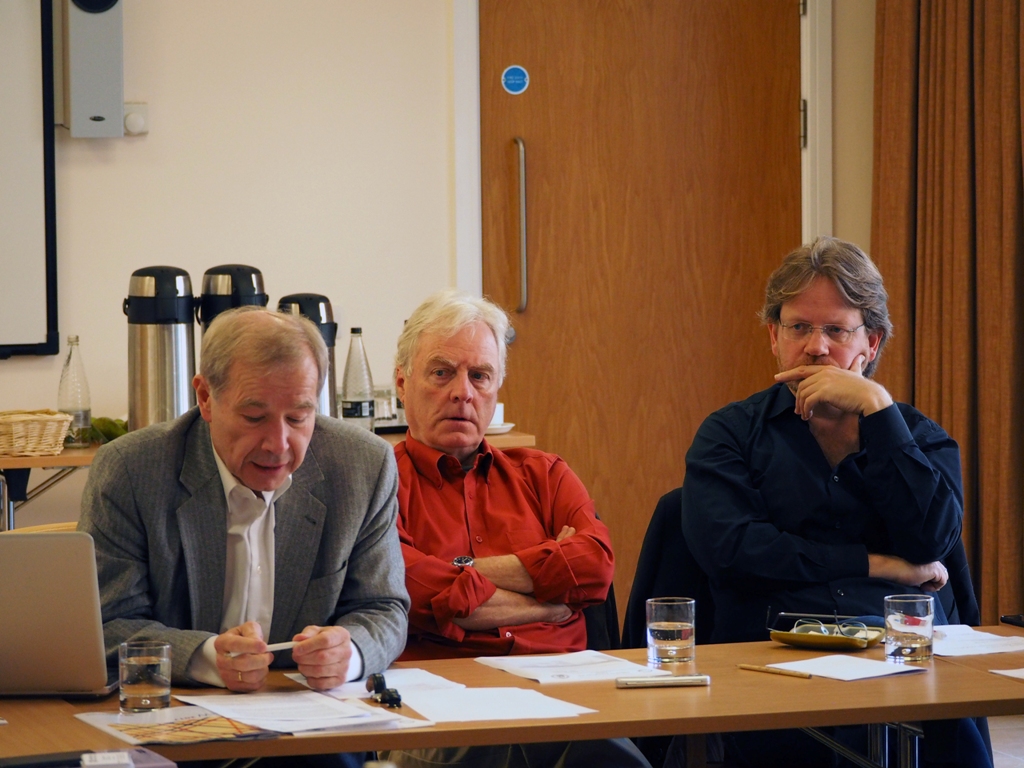 |
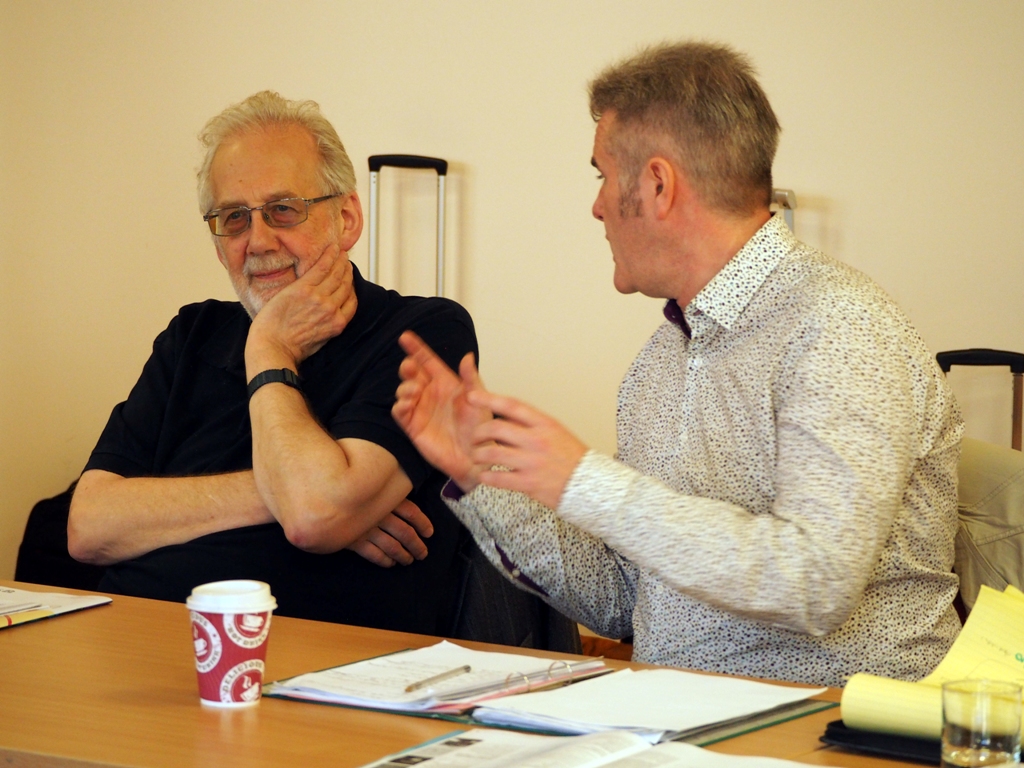 |
* Co-funded by the Göttingen Association for Comparative and International Criminal Law and Criminal Justice and the Fritz Thyssen Foundation
Professor Kai Ambos has initiated a project on the foundational principles and concepts of Anglo-German Criminal Law and Justice. The project participants come from Germanic and Anglo-American jurisdictions, and have been carefully selected to reflect a diversity of backgrounds with either a more theoretical/normative or a more empirical focus. All are distinguished international scholars. The general editor of the project is Prof. Kai Ambos, the editorial committee consists of Prof. Antony Duff (University of Stirling), Prof. Julian Roberts (University of Oxford) and Prof. Thomas Weigend (University of Cologne).
Criminal law and criminal justice is becoming increasingly globalised. The era in which individual jurisdictions developed their own codes, statutes and systems of justice with little regard to other systems and countries is long over. In its place there is a growing desire to develop common approaches to common problems and to learn from the diversity of current practice in differ-ent countries. That development, however, requires a thorough, systematic, multi-jurisdictional comparative analysis, of a kind that has not been provided by recent and existing comparative projects—which are still relatively infrequent, and typically focus on a specific topic or issue. The aim of such a systematic analysis would be to see whether it is possible to articulate a common grammar or set of foundational concepts that could ground productive trans-jurisdictional discussion and progress. This project will explore that possibility.
At present, attempts at trans-jurisdictional debate and agreement are too often beset by mutual misunderstanding. Although English is the new lingua franca in international and comparative criminal law (as well as in international criminal justice institutions), there are many ambiguities and uncertainties with regard to foundational criminal law concepts. The principal reason for this is that they do not exclusively originate from the English-speaking common law world but are to a great extent taken from the civil law jurisdictions of France, Germany and Italy. As a result, the application of these concepts in English – by and within international institutions and even in academic discourse – is often ambiguous or even misleading. Professionals working in these or-ganisations and academics engaged in collaborative comparative (criminal) law projects often do not understand each other, using the same terms with different meanings or different terms mean-ing the same. There is no consensual common language. One of the purposes of the current project is to see whether it is possible to develop such a common grammar for fundamental concepts. If such a grammar can be developed, this will facilitate and enhance collaborative, cross-jurisdictional exchanges, leading to comparative and theoretical insights.
To make the project manageable, it will initially focus on the Germanic (Germany, Austria, Switzerland) and principal Anglo-American jurisdictions (England and Wales, Scotland, the USA, and Canada), to establish whether they share a set of foundational concepts. In a second phase, we may extend the inquiry beyond these jurisdictions, to broaden the basis of our findings, and may include further civil law jurisdictions (particularly France, Italy, and Spain as well as Scandinavian countries); further, we will have to consider looking beyond Europe and North America—to Africa, to China, to Japan and Latin America. The method of analysis is comparative (multi-jurisdictional), analytical and empirical, with an initial focus—as noted above—on Germanic and Anglo-American jurisdictions.
The project group has already met to conduct a project ‘scoping’ meeting in Cambridge (in July 2016), followed by meetings in Göttingen (March 2017), Oxford (September 2017), Frankfurt am Main (April 2018), Edinburgh (September 2018), Zürich (April 2019), and Rutgers, New Jersey (September 2019). Due to COVID-19, the Group held its first virtual meeting in December 2020. The next meeting is planned for Berlin, Freie Universität (14-15 January 2022), follwed by: Falmer, Sussex (29-30 July 2022), Marburg (Spring 2023) and Belfast (Autumn 2023). The intention is to mount two meetings each year, alternating between Germany and the UK/Ireland/USA.
Given the multijurisdictional and multidisciplinary approach of the project, we aim at having co-authored papers for different topics on Criminal Law, Criminal Procedure and Criminal Justice, with authors from different jurisdictions as well as theoretical and empirical backgrounds. The editorial committee, consisting of the General Editor, the Domain Editors and the Advisor, will take the final decision on publication of a paper. As to publications, Cambridge University Press agreed to publish the scholarly output of the project. The first Volume of the Core Concepts has been published at the beginning of 2020. Volume II is planned for 2021. Further volumes will follow, we envisage the publication of three volumes in total at this stage, published in a one-year-interval.
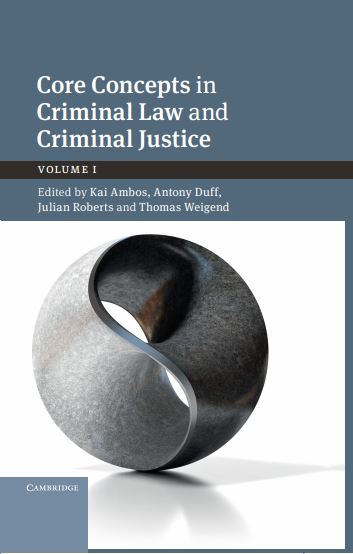 |
Core Concepts in Criminal Law and Criminal Justice Volume 1: Anglo-German Dialogues Published January 2020 ISBN 9781108483391 |
Participants
General Editor
Prof. Dr. Dr. h.c. Kai Ambos (Georg-August-University of Göttingen)
Domain Editors
Criminal Law: Prof. Antony Duff (University of Stirling/ University of Edinburgh)
Criminal Procedure: Prof. Dr. Thomas Weigend (University of Cologne)
Criminal Justice: Prof. Julian Roberts (University of Oxford)
Dr. Alexander Heinze, LL.M. (TCD) (Georg-August-University of Göttingen)
Authors
Prof. Dr. Dr. h.c. Kai Ambos (Georg-August-University of Göttingen)
Prof. Dr. Stefanie Bock (Philipps-University Marburg)
Prof. Sir Anthony Bottoms (University of Cambridge)
Jun.-Prof. Dr. Dominik Brodowski, LL.M. (UPenn) (Universität des Saarlandes)
Prof. Dr. Christoph Burchard, LL.M. (NYU) (Goethe-University Frankfurt a.M.)
Prof. Vincent Chiao (University of Toronto)
Dr. Alessandro Corda (Queen's University Belfast)
Dr. Andrew Cornford (University of Edinburgh)
Dr. Antje du Bois-Pedain (University of Cambridge)
Dr. Matthew Dyson (University of Oxford)
Prof. Richard Frase (University of Minnesota)
Prof. Shannon Fyfe (George Mason University, Fairfax, VA)
Prof. Dr. Sabine Gless (University of Basel)
Prof. Stuart P. Green (Rutgers Law School)
Prof. Dr. Stefan Harrendorf (Ernst Moritz Arndt University of Greifswald)
Dr. Alexander Heinze, LL.M. (TCD) (Georg-August-University of Göttingen)
Prof. Dr. Katrin Höffler (Georg-August-University of Göttingen)
Prof. Dr. Tatjana Hörnle (Max Planck Institute for the Study of Crime, Security and Law and Freiburg, Humboldt University of Berlin)
Prof. Dr. Elisa Hoven (University of Leipzig)
Prof. John Jackson (University of Nottingham)
Prof. Neha Jain (European University Institute, Florence)
Prof. Dr. Johannes Kaspar (University of Augsburg)
Dr. Kyriakos Kotsoglou (Northumbria Law School)
Prof. Máximo Langer (UCLA, California)
Prof. Youngjae Lee (Fordham University)
Prof. Arlie Loughnan (University of Sydney)
Prof. Sandra Marshall (University of Sterling)
Prof. Dr. Frank Meyer (University of Zürich)
Prof. Dr. Carsten Momsen (FU Berlin)
Prof. Thomas O’Malley (NUI Galway)
Nicola Padfield (University of Cambridge)
Dr. Anneke Petzsche, MSc (Oxford) (Humboldt University of Berlin)
Prof. Julian Roberts (University of Oxford)
Prof. Paul Roberts (University of Nottingham)
Prof. Jacqueline Ross (University of Illinois)
Prof. Robert Schehr (Northern Arizona University)
Dr. Findlay Stark (University of Cambridge)
Prof. Dr. Carl Friedrich Stuckenberg (University of Bonn)
Prof. Stephen C. Thaman (Saint Louis University)
Prof. Malcolm Thorburn (University of Toronto)
Prof. Jenia Iontcheva Turner (SMU Dedman School of Law)
Prof. Richard Vogler (University of Sussex)
Prof. Alec Walen (Rutgers)
Prof. Dr. Thomas Weigend (University of Cologne)
Prof. Dr. Bettina Weißer (University of Cologne)
Prof. Lucia Zedner (University of Oxford)
Prof. Dirk Van Zyl Smit (University of Nottingham)
List of Topics
Meetings
I. Cambridge, 18 July 2016
Scoping Meeting
II. Göttingen, 27/28 March 2017
Participation (outline)
Antje du Bois-Pedain (Cambridge); Commentator Stefanie Bock (Marburg)
Normative Pluralism/structure (Codification, common law, general/special part, general principles etc.) (outline)
Matthew Dyson (Oxford); Commentator Paul Roberts (Nottingham)
Crimes of endangerment
Antony Duff (Stirling); Commentator Christoph Burchard (Frankfurt)
Sexual Crimes
Thomas O’Malley (Galway); Commentator Carl-Friedrich Stuckenberg (Bonn)
Charges (accusation, indictment)
Thomas Weigend (Köln); Commentator Neha Jain (Minnesota)
Criminal history enhancements at sentencing
Julian Roberts (Oxford); Commentator Stefan Harrendorf (Greifswald)
Action and omission (conduct)
Kai Ambos (Göttingen); Commentator Alec Walen (Rutgers)
III. Oxford, 18/19 September 2017
Structure in Criminal Legal Reasoning
Frank Meyer (Zürich)/ Matthew Dyson (Oxford)
Constitutional Criminal Law
Malcolm Thorburn (Toronto)/ Christoph Burchard (Frankfurt am Main)
Preparatory Offences
Findlay Stark (Cambridge)/ Stefanie Bock (Marburg)
Proportionality of Punishment/ Sentencing
Richard Frase (Minnesota); Commentators: Tom O'Malley (Galway)/ Carsten Momsen (Berlin)
Negotiated Justice
Jenia Turner (SMU Dedman School of Law, Dallas, Texas); Commentator Kai Ambos (Göttingen)
Due Process
Lucia Zedner (Oxford); Commentator Carl-Friedrich Stuckenberg (Bonn)
Concepts and Taxonomies of Criminal Procedure
Paul Roberts (Nottingham); Commentator Thomas Weigend (Köln)
|
IV. Frankfurt am Main, 5/6 April 2018
Prosecutorial Discretion
Coercion (General, Coercive/ Investigative Measures)
Terrorist Offences
Admissibility/ non-use, exclusion of evidence
Criminal History Enhancements at Sentencing
Proportionality of Punishment/ Sentencing
Consent in Sexual Crimes |
|
|
V. Edinburgh, 1/2 September 2018
The Origins of Civil and Common Law in Comparative Criminal Justice
Participation
Implementation of Sentences
Responsibility for Outcomes (Causation/ Imputation)
Crimes of Endangerment
|
VI. Zürch, 4/5 April 2019
See programme here
VII. Rutgers, New Jersey, 8/9 September 2019
See programme here
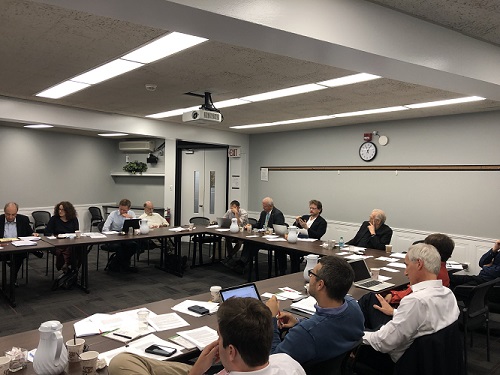 |
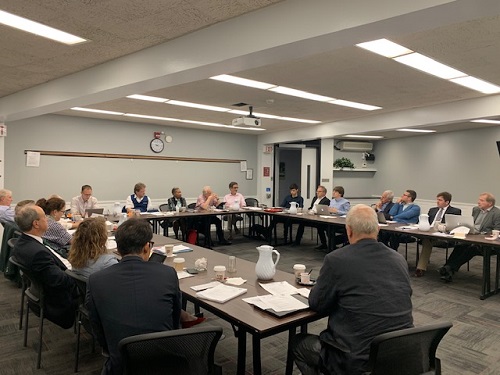 |
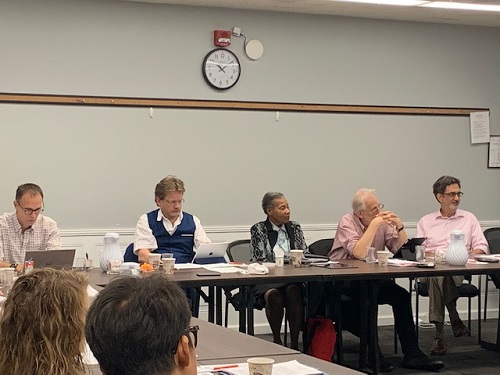 |
VIII. Virtual Meeting, 18 December 2020
Arrest and Coercion
Richard Vogler (Sussex, Dominik Brodowski (Saarbrücken); Commentators: Weigend (Köln), P. Roberts (Nottingham)
IX. FU Berlin, 14-15 January 2022
X. Falmer, Sussex, 29-30 July 2022
XI. Marburg, Spring 2023
XII. Belfast, Autumn 2023
 |
Core Concepts in Criminal Law and Criminal Justice Volume 1: Anglo-German Dialogues Published January 2020 ISBN 9781108483391 |
Project Manager: Dr. Alexander Heinze
Universität Göttingen erhält EU-Förderung für Forschung zur Europäischen Ermittlungsanordnung
Die Abteilung für Ausländisches und Internationales Strafrecht und Strafprozessrecht (Prof. Dr. Dr. h.c. Kai Ambos) des Instituts für Kriminalwissenschaften gehört zu einem Team von sechs Partnern, dem von der EU-Kommission eine größere Fördersumme zugesprochen wurde, um die praktischen Auswirkungen der Europäischen Ermittlungsanordnung (EEA) zu erforschen. Die Richtlinie über die EEA trat am 22.5.2017 in Kraft. Die EEA soll die gesamte Beweisrechtshilfe in Strafsachen zwischen den Mitgliedstaaten der EU neu regeln. Sie ist eine gerichtliche Entscheidung, durch die von einer Justizbehörde eines Mitgliedstaats die Durchführung einer oder mehrerer spezifischer Ermittlungsmaßnahmen zur Erlangung von Beweisen in einem anderen Mitgliedstaat angeordnet wird. Das Projekt wird koordiniert durch die Universität Maribor.
Evaluación interdisciplinar de la adecuación de los diversos instrumentos jurídicos de tutela de la privacidad ante las amenazas que presenta, sobre todo, la difusión de las nuevas tecnologías en el contexto de la Sociedad de la Información y del Conocimiento. Partiendo del Derecho penal, fundamentalmente, se trata de examinar dos perspectivas que ponen de manifiesto las crecientes dificultades para delimitar el derecho a la intimidad (y, en consecuencia, para ofrecer una protección jurídica equilibrada): por un lado, la que resulta de las colisiones más significativas entre la intimidad y otros derechos fundamentales y libertades públicas y, por otro, la que deriva de la concurrencia de órdenes jurídicos diversos dotados de instrumentos regulativos no siempre bien coordinados.
Conforme a la orientación del Proyecto, se ofrece un equipo interdisdisciplinar concebido para garantizar una razonable sistematización teórica a la vez que una adecuada perspectiva pragmática en el tratamiento de los distintos temas objeto de la investigación.
Se trata de construir un sistema analítico flexible en torno a la problemática jurídica de la privacidad en el marco de la Sociedad de la Información y del Conocimiento, capaz de responder a las necesidades de los operadores jurídicos, así como de elaborar pautas de política jurídica y de teoría y técnica legislativa y valorativas de cara a eventuales reformas que permitan afrontar, con los instrumentos jurídicos más adecuados y en las mejores condiciones de garantía y efectividad, las dificultades observadas.
Subcategories
Neue Veröffentlichungen & Interviews
Aufsatz von Herrn Prof. Ambos und Ivan Ricardo Morales Chinome, LL.M, DRiZ, 01/2025: "Zwei Jahre Politik des totalen Friedens in Kolumbien"
Treatise on International Criminal Law, Volume III: International Criminal Procedure (Neue Auflage) vom 12.12.2024:
Link zum Shop der Oxford University Press
Link zum Buch: "Apartheid in Palästina?", Prof. Dr. Dr. h.c. Kai Ambos, Westend Verlag, Erscheinungsdatum am 08.04.2024
s. auch hier den Flyer zum Buch
Book Review: Apartheid in Palästina?", Norman Paech, Völkerrechtsblog, 27.07.2024
Buchrezension, Harry Gerson, ZfIStw, 03/2024
"Krieg mit den Kampfbegriffen", Rezension aus der Frankfurter Allgemeine, 07.05.2024
"Kai Ambos: Apartheid in Palästina?", Lesart, Deutschlandfunk Kultur, 20.04.2024
"Israel und die Palästinenser: Objektiv liegen Merkmale eines Apartheid-Systems vor", Interview mit Prof. Dr. Dr. h.c. Kai Ambos, Telepolis, 17.04.2024
"Apartheid in Palästina und Klimaschutz ist weiblich" , WDR Politikum - der Meinungspodcast (ab Min. 03:13), vom 12.04.2024
"Die Lage in Israel, ab Minute 59" , Interview mit Prof. Dr. Dr. h.c. Kai Ambos, Podcast "FAZ Einspruch" vom 10.04.2024
"Andere Staaten dürfen ein solches System in keiner Weise unterstützen", Interview mit Prof. Dr. Dr. h.c. Kai Ambos, Overton Magazin, 09.04.2024
"Gradmesser der Besatzungsherrschaft", Ronen Steinke, Rezension in der Süddeutschen Zeitung, 07.04.2024
Rezension aus der Berliner Zeitung, 28.03.24:
Während Ambos sich zuvor mit der „Doppelmoral“ des Westens im Zusammenhang mit dem Krieg in der Ukraine befasst hat – ebenfalls im Westend-Verlag erschienen – gilt seine Aufmerksamkeit nun der Frage, ob und wenn ja, inwieweit Apartheid in Palästina herrscht.
Ambos legt in seinem Buch dar, dass der Apartheidvorwurf um einiges älter ist als die jüngere Debatte, ausgelöst durch die Berichte der Menschenrechtsorganisationen Human Rights Watch und Amnesty International. Man erfährt dazu weiter, dass sich erste Ansätze schon in den Veröffentlichungen einiger palästinensischer Intellektueller in den 1960er-Jahren finden und dass in den 1970er-Jahren Rassismus und Zionismus in Resolutionen der UN-Generalversammlung gleichgestellt wurden. Explizit wurde der Apartheidvorwurf dann erstmals auf der Weltkonferenz gegen Rassismus 2001 im südafrikanischen Durban erhoben. Er wurde in Bezug auf „die ethnische Säuberung der arabischen Bevölkerung im historischen Palästina“ erwähnt und die „ausländische Besatzung auf der Grundlage von Siedlungen“ wurde als „eine neue Apartheid“ bezeichnet.
Allerdings beantwortet Ambos die von ihm formulierte Frage „Apartheid in Palästina?“ nach Eindruck des Rezensenten eher ambivalent.
- „Unmenschliche Handlungen“, die denen in Art. 7 Abs. 1 IStGH „ähnlich“ sind
- Die Existenz eines „institutionalisierten Regimes der systematischen Unterdrückung und Beherrschung einer rassistischen Gruppe oder Gruppen“
- Die (spezifische) „Absicht der Aufrechterhaltung“ des so definierten Regimes
Richtig ist, dass – wie Ambos betont – es letztlich von den Umständen des Einzelfalles abhängt, ob ein Apartheidvorwurf gegen einen bestimmten Angeklagten vor einem unabhängigen Gericht Bestand haben kann. Aber das betrifft die strikte völkerstrafrechtliche Individualverantwortung. Es erscheint zu einseitig, die Beantwortung der Frage nach „Apartheid in Palästina“ allein durch das Anlegen des völkerstrafrechtlichen Maßstabes vorzunehmen. Für die weitere Forschung sieht der Rezensent deshalb vor allem in jenem Teil des Buches von Ambos, der sich dezidiert mit der Frage nach Apartheid in den besetzten Gebieten Palästinas jenseits des Völkerstrafrechts befasst, weitere Entwicklungsmöglichkeiten. Es sind dies dann keine abstrakten Überlegungen mehr, wie sie Ambos nach seinem jetzigen Erkenntnisstand aber offenbar versteht.
Kai Ambos: Apartheid in Palästina? Eine historisch-völkerrechtliche Untersuchung. Westend, Frankfurt a. M. 2024, 256 Seiten, 25 Euro
Prof. Kai Ambos im Podcast "Politisches Feuilleton": Deutschsein auf Bewährung?, Deutschlandfunk Kultur, 30.01.2025
Text dazu: "Zur Strafe nicht mehr deutsch"
Vortrag zum Thema: Völker(straf)recht in Bedrängnis: Was bleibt von der Weltfriedensordnung?
von Prof. Kai Ambos, Vortragsveranstaltung der Polytechnischen Gesellschaft, Frankfurt, 28.01.2025
Podcast mit Herrn Prof. Ambos zur Frage der Staatsräson: "Was bedeutet eigentlich Staatsräson?", Deutschlandfunk Kultur, 03.12.2024
Verschriftlichung des Podcasts (Pdf): "Staatsräson: Dekonstruktion eines überholten Konzepts"
"Rechtsbruch mit Ansage", Beitrag von Prof. Ambos, Verfassungsblog, 25.02.2025
"ICJ Advisory Opinion", Kai Ambos (ed.), The 2024 ICJ Advisory Opinion on the Occupied Palestinian Territory, Verfassungsbooks, 2024; PDF dazu
"Die Macht des Stärkeren - Wie stabil ist das internationale Recht?", Diskussion mit Prof. Ambos et. al., Gesprächsrunde bei SWR Kultur, 02.12.2024
"Verhältnismäßigkeit kaum zu begründen", Gespräch mit Prof. Ambos, HNA, 28.11.2024
"Wird Deutschland sich an Netanyahus Haftbefehl halten?", Interview mit Herrn Ambos ab Min. 3:30, DW arabic, 25.11.2024
Hinweis auf: Gerichtliche Streitbeilegung statt Gewalt, von Prof. Ambos, Wissenschaft und Frieden, 4/2024: Link zur Website
"Welche Verpflichtungen hat eine Besatzungsmacht den Zivilisten gegenüber?", Interview mit Herrn Prof. Ambos zur Rolle Israels als Besatzungsmacht, HR Info, 13.11.2024
"Den Haag vs.Berlin? Deutsche Außenpolitik in Nahost zwischen Völkerrecht und Staatsräson", Expertengespräch mit Herrn Ambos et al., medico international, 25.10.2024
"What International Law says about Israel's Invasion of Lebanon", Interview mit Herrn Ambos et al., New York Times, 12.10.2024
"The 2024 ICJ Advisory Opinion on the Occupied Palestinian Territory - An Introduction", Beitrag von Herrn Prof. Ambos, Verfassungsblog, 09.10.2024
"Criminal "Apartheid" in the occupied territory? A call for more nuanced approach from the perspective of international criminal law", Kai Ambos, Fordham International Law Journal, 2024
"Steht die Nahost-Region vor einem großen Krieg?", Herr Prof. Ambos im Gespräch, Deutschlandfunk, 04.10.2024
"Complementarity and the German Amicus Curiae Submission in the ICC Palestine Arrest Warrant Proceedings", Beitrag von Herrn Prof. Ambos, EJIL! Talk - Blog of the European Journal of International Law, 19.08.2024
Beitrag auf Deutsch im Verfassungsblog, 19.08.2024: "Staatsräson vor Völker(straf)recht?"
"From the river to the sea..", nicht per se strafbar, auch nicht gemäß §86a Abs. 1 Nr. 1 StGB", Beitrag von Herrn Prof. Ambos et al., JuristenZeitung, 08.07.2024
"Without Fear Or Favor", Beitrag von Herrn Ambos et al. im Verfassungsblog, 14.06.2024
"Ohne Ansehen der Person", Gastbeitrag von u.a. Herrn Ambos, FAZ Einspruch, 12.06.2024
"Israels Offensive in Rafah und das Völkerrecht", Podcast mit Herrn Ambos, FAZ Einspruch, vom 29.05.2024
"IGH-Urteil zu Rafah - Völkerrechtler: Eingriff in Israels Selbstverteidigungsrecht", Podcast mit Herrn Ambos, Deutschland Funk Aktuell, 25.05.2024
"Selbst der Einfluss der USA auf Israel ist begrenzt", Interview mit Herrn Ambos, Frankfurter Rundschau, 22.05.2024; Artikel als PDF
"Nach meinem Eindruck gibt es enorm viele Beweise", Interview zu den Haftbefehlen gegen Israel und die Hamas mit Prof. Ambos, Zeit Online, 21.05.2024; Artikel als PDF
"Scharfgestellte Staatsräson", Beitrag von Prof. Kai Ambos, Verfassungsblog, 02.05.2024
"Israels Besatzungspolitik: Völkerrechtlich spricht viel für ein Apartheidsystem in den besetzten Gebieten", Interview mit Prof. Dr. Dr. h.c. Kai Ambos, Tagesspiegel, 02.05.2024
"Nicaragua extends the legal battle over Palestine", Beitrag in der ICJ, 12.04.2024
"Apartheid in the Occupied Palestinian Territory?" Prof. Dr. Dr. h.c. Kai Ambos, Verfassungsblog, 03.04.2024
"Apartheid in den besetzten palästinensischen Gebieten?", Prof. Dr. Dr. h.c. Kai Ambos, Beitrag in der Frankfurter Allgemeine vom 15.03.2024



